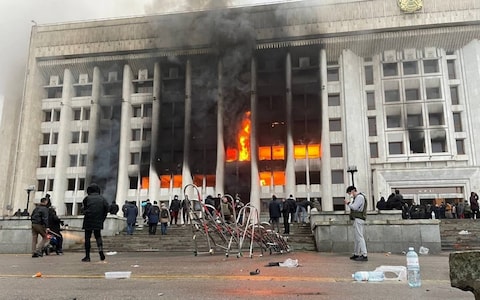
Kazakhstan is a landlocked country in Central Asia. It borders Russia in the north and west, China in the east, and Kyrgyzstan, Uzbekistan, and Turkmenistan in the south. It is the ninth-largest country in the world with a population of 18.8 million. Kazakhstan is the dominant nation of Central Asia economically and politically, generating 60% of the region’s GDP, primarily through its oil and gas industry. It is a member of the OPEC+ alliance and has also sent uranium prices higher as it accounts for around 40% of the global supply of the mineral. It also has vast mineral resources.
Kazakhstan was the last of the Soviet republics to declare independence during the dissolution of the Soviet Union in 1991. Nursultan Nazarbayev led the country from 1991 to 2019. He was succeeded by Kassym-Jomart Tokayev. Their rule was associated with corruption, socio-economic disparity, failure to control COVID-19, the rise of LPG Prices and the rise of democracy awareness. The Country was in the News since the rule of Nursultan Nazarbayev for violating Human-rights, targeting, killing and oppression of opposition including jailing critics, to maintain control. In 2020, Freedom House rated Kazakhstan as a “consolidated authoritarian regime”, stating that freedom of speech is not respected and “Kazakhstan’s electoral laws do not provide for free and fair elections.
All the above factors boiled and exploded in 2022 as chaos became rampant from Jan. 2, when protesters entered streets and clashed with security forces after the government’s decision to increase the price of liquefied petroleum gas, which had been price-capped. Cars were set ablaze and police deployed tear gas as crowds swarmed the city centre and tried to storm some government buildings. Gunfire and the sound of stun grenades were seen as some parts of the airport seized, disrupting flights. Gunfire continued through. Presidential residence, Mayor’s office were targeted and City Hall in Almaty was set ablaze. An angry mob took over the airport. Protesters set fire to police vehicles and to the regional branch of the ruling Nur Otan party. The police, in turn, accused demonstrators of being responsible for the deaths of 13 officers and for leaving 353 injured.
The Kassem-Jomart Tokayev government resigned under pressure from the escalating demonstrations. Mr Tokayev accepted the resignation of his cabinet and installed an interim prime minister, Alikhan Smailov, an ally who used to serve as first deputy prime minister. Presently the government has shut down access or disrupted connections to many websites and social media platforms. Mr Tokayev has ordered security forces to shoot without warning. He has called the protesters “a band of terrorists,” declared Kazakhstan under attack and asked the Russia-led military alliance to intervene.
Russia and CETO Enters the Pitch
Kazakhstan is a close ally of Russia and the present Government has the backing of Russia. Out rightly Russia’s Foreign Ministry said Moscow supported “a peaceful solution to all problems within the framework of the constitutional and legal field and dialogue, and not through street riots and violation of laws.” Russian is exercising its Moscow-led security alliance known as the Collective Security Treaty Organization, which was created after the fall of the Soviet Union. Mr Tokayev said he called for CSTO reinforcements and has also declared a two-week state of emergency in the western Mangistau region and in Almaty, the Central Asian nation’s largest city. Russian paratroops are on the ground providing support to President Kassym-Jomart Tokayev’s. The Protesters are demanding basic human rights with broader political liberalization, end to corruption, checkmate socioeconomic disparity, reduce LPG Price, changes in an election system for regional leaders, who are currently appointed by the president and more.
Happenings in the Central Asian gateway that is Kazakhstan is not good for the region as Russia feels threatened in its backyard. 2014 Ukraine Crisis, then Belarus Crisis 2020 now Kazakhstan crisis make Russia unsecure as countries of the former Soviet Union are also watching the protests closely, and the events in Kazakhstan could help energize opposition forces elsewhere.
China has a nearly 1700 km border with Kazakhstan. China with its debt-trap diplomacy, eye on natural resources want to amass the land, air and water of Kazakhstan if there is chaos and political instability there. Taliban, ISIS, Al Qaeda can enter Central Asia easily through Kazakhstan as it has more than seventy per cent Islamic Population radicalization can have a great effect on the region? The US has energy concerns theirs as Exxon Mobil and Chevron have invested tens of billions of dollars where the unrest began this month and they have their say too?
What must India do?
For India happenings in Kazakhstan is a concern as India wants a peaceful democratic globalized Central Asia where they are interconnected and interlinked. Otherwise, they can easily be trapped by Jihadists like the Taliban, ISIS, Al Qaeda, to more… Central Asian countries with huge mineral, oil & gas resources and huge land are not able to defend except Russia’s support as their population is very less like Uzbekistan 3.3 Crore, Kazakhstan 1.8 crore, Tajikistan less than 10 Lakhs, Kyrgyzstan less than 70 Lakhs, and Turkmenistan 65 Lakhs or less.
The China factor can’t be ignored as it can take advantage of the political crisis for amassing land air and water of Kyrgyzstan. Kazakhstan has to come out of this political crisis and establish a democratic government and be open to the world and change its image. Otherwise, it will become a burden on the world. Talking to protestors and giving them their rights to live can make things better. As the world is moving towards democracy and globalization, Kazakhstan should also move in that direction otherwise it will become another Pakistan, North Korea, or a Talibanised Afghanistan. It is for their government to talk to protestors and end the crisis amicably.
(The views expressed are authors own)
M.AM.PhiL/(PhD SNU South Korea)
